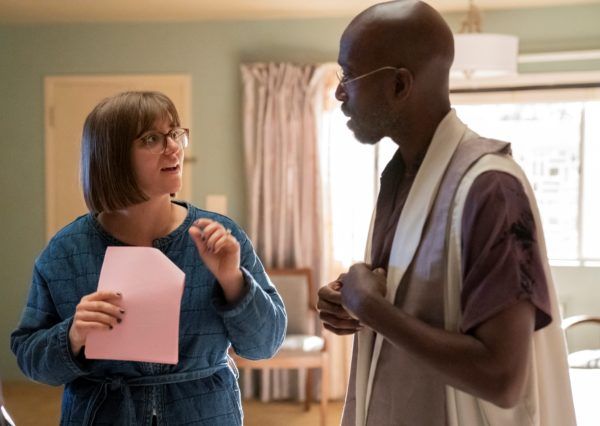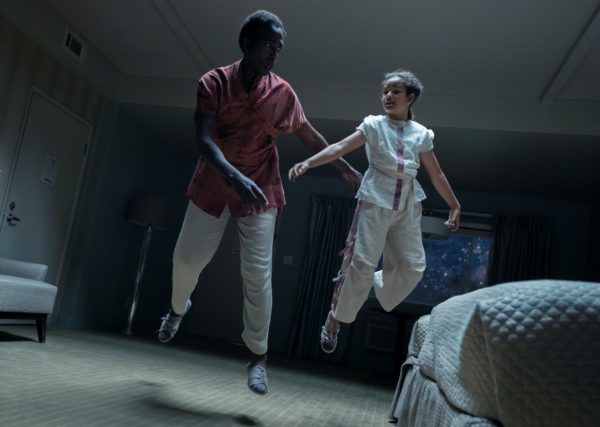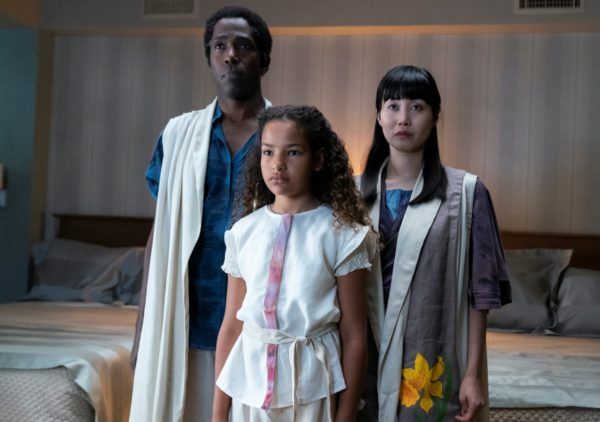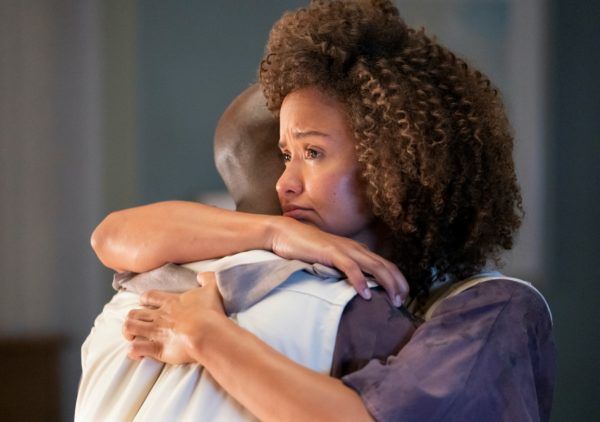Created by Mark and Jay Duplass, the HBO half-hour anthology series Room 104 is currently in its fourth and final season, with 12 new episodes that explore different genres, characters, tones, plots and time periods. Set in the same room of a typical American chain motel, the characters and the director change from episode to episode (although there are some repeat filmmakers), and the story being told can be anything from dark comedy to sci-fi to sitcom to animation. Sometimes there’s blood, sometimes there are tears, sometimes there are original songs, and sometimes there’s even a bit of dancing.
During this 1-on-1 phone interview with Collider, executive producer Sydney Fleischmann — who also directed the Season 4 episode “Generations” from a script written by Julian Wass — talked about her journey from Mark Duplass’ assistant to executive producer, finally tackling an episode of Room 104 as a director, learning from all of the other directors on the show, the challenges of the very tight time frame, the experience of telling an entire story within one room, and what she’d like to do next.
Collider: How did you originally get involved with working on this show?
SYDNEY FLEISCHMANN: It’s something that I’ve had to come to terms with being open about. I actually started working with Mark and Jay [Duplass] as Mark’s assistant on Togetherness. I worked on both seasons of Togetherness and, in that time, produced a couple of projects on the side for Mark. And then, they had this idea for Room 104 for a long time and the timing just hadn’t lined up, or it hadn’t been the right moment for it yet. And then, in 2016, it just felt like the right time to go pitch it. Mark and Jay came to me and said, “Do you wanna produce this show?” And that was how it happened. I remember I was sitting at my desk, in the Togetherness post-production office, and that was the beginning of my involvement in the show. We developed it, came up with a look book and pitched it to HBO, and the rest is history.
Going from assistant to producer to now director, what’s been going through your mind about that journey?
FLEISCHMANN: A lot. I’m sure I’ve experienced imposter syndrome. I’ve been given this title and I’m not sure that I’m worthy of it, or if I have worked hard enough for it, and all of those things that we ask ourselves and we question ourselves with. As Room 104 has evolved and grown, I have definitely grown and evolved with it. In the creation of Room 104, I’ve really found my footing and where I feel confident as a producer and where I feel like I have gaps in my education, I wanna learn things. It’s definitely been this personal journey for me, creating the show. Now, in the final season, it’s been this really special moment to look back and see how I’ve grown and changed with it.
It seems like this is definitely a show where you could learn a lot of different things because the episodes are so different and it’s all different kinds of genres. Even though the episodes are all in one location, it seems like you would still learn a ton.
FLEISCHMANN: Definitely, yeah. We talk a lot about how, in creating these really specific limitations for ourselves, specifically the room itself, we really opened ourselves up to any possibility and any director coming in and any actor and any story. Having this really safe place that really feels like home, in a lot of ways, we’re able to just go anywhere and be really free. I’ve met such incredible people in doing it because we’re constantly bringing new people in. I think about all the directors that I’ve met and the actors. It’s just like how you operate in life. The more people you meet and the more open you are to meeting new people, the more you’re gonna learn.
As a director, it seems like you have to have a certain level of confidence on a set because everybody’s looking to you for answers to questions. Do you feel like seeing all of the other filmmakers work over the seasons helped you have some of that confidence going into doing your own episode that you might not have had if you hadn’t watched everybody else doing it?
FLEISCHMANN: Definitely, yeah. Seeing how the different directors function and how they communicate definitely had an impact on how I approached my episode. It’s a different perspective. I wasn’t fully aware of that, going into directing, how different it would feel from producing. As the producer on the show, I feel like I have to know everything that’s going on at all times. I feel like the information hub for the whole process, and I feel confident in that. And then, stepping into this new role, it’s a different kind of confidence. It’s a different ability to really speak up and say, “This is my creative idea. This is the leap that I wanna take. And I want you to all leap with me.” It’s a very different view. I’ve just had the great fortune to work with directors who really know how to handle that position.
What do you feel you’ve learned about yourself as a director from actually directing? Did you learn about strengths that you didn’t know you had?
FLEISCHMANN: Yeah. That’s a really good question. I definitely learned to trust myself and to trust my creative ideas. The way that we make the show, it’s so open and there’s so much trust but I think that, as a director with all of those eyes on you, it’s a really vulnerable position to be in. That was definitely a big takeaway. The emotional fortitude of picking a path and sticking with it.
When it came to doing this, were there things, going into the production of it, that felt the most challenging and that you were most concerned about, with this episode specifically?
FLEISCHMANN: In terms of the production of it and the telling of the story, there are a couple spoilers and it’s something that we’ve talked about, throughout the whole show, especially in the marketing of it, of how much do we want to give away. And in this episode, it was hard to distinguish, “If we do tip this off, does it diminish the ending? Will the episode still land, if it’s tipped off too early?" Navigating those plot devices and plot points was challenging.
Are there a lot of challenges in having to shoot something so quickly?
FLEISCHMANN: It’s definitely a whirlwind and it puts a lot of pressure on the cast to just be ready to go. I’ve gotten used to the pacing of it but it’s still a challenge. It still feels like, “Are we gonna get it all? Are we gonna get what we’re looking for?” But with this particular episode, I actually felt like we planned it all really well. I owe so much to our cinematographer, Sean McElwee, and our first AD, Drew Langer, who really created this very supportive system around me, so that we could make those game time decisions of, “We don’t have time for this, so let’s get this.” It’s a lot of thinking on your toes and trusting your gut.
It seems like that would be hard to do when you’re trying to figure out what works and what doesn’t while you’re on the set and you have such a short time frame. It just seems all kinds of insanely overwhelming.
FLEISCHMANN: Yeah, it is overwhelming. I’m saying this as a producer, we try to create a bubble around the director and the cast, so that they don’t feel any of that rushing feeling or that feeling of, “We’ve gotta move on.” Having virtually the same crew for every season, they know the rhythms of the show and they know how long everything takes. Having that safety net around the actors and the director really gives them the space and the time that they need to do great work.
This episode that you did feels different because it almost sort of feels like an unfamiliar world inside of this familiar surrounding that we’re used to seeing for each episode. How did you approach the way the episode would feel? Was there anything specific you wanted to do with it, as far as how you shot it or the look you wanted it to have?
FLEISCHMANN: Yeah, we talked a lot about the look. There are the present day parts, and then there are flashbacks, and I wanted each of those to feel different. We wanted the flashbacks to have this warm feeling, and then the present day to have more of a cold feeling but something that you couldn’t really put a finger on. There’s one little spoiler that I’m so hesitant to give away because it feels like a big part of the viewing experience. We wanted to make sure that it didn’t feel clinical but that it did have something off about the look of it.
In what ways would you say that telling an entire story inside of one room feels freeing and in what ways does it feel constricting?
FLEISCHMANN: It’s definitely freeing in the sense that we’re only focused on the 25 to 30 minute portion of whatever these characters’ vibes are. We’re not going so far out to think of where they were before this or after this. It’s really just these moments in time with these characters. That’s really freeing because it allows you to really go in. Sometimes the challenge with that, of only having this amount of time, is how do you wrap it up? That’s definitely a conversation that we’ve had throughout the entire series of these episodes. We wanna subvert expectations and we wanna have a satisfying ending, so how do we navigate that, knowing that there’s virtually no chance we’re coming back to this person? That’s definitely been a challenge, to have satisfying endings, whatever that means, whether it’s playing into people’s expectations or just going completely in a different direction.
What do you feel that you’ve learned from working and collaborating with Mark Duplass? With something like this, does he give you any advice or notes, or is it more that he’s there to answer questions if you might have any?
FLEISCHMANN: It’s a good question. I have learned from him just through how he treats me. From the beginning of our relationship, he’s really put this trust in me that a lot of people are hesitant to do. It’s a giant leap of faith to just give that kind of trust to somebody. I have definitely learned that in the other people that we work with, to have that trust with them and know that we all have a common goal, and everybody’s gonna have different ideas about how to approach things, and that’s really an asset. That’s a really great thing. Our relationship has definitely changed from that assistant-boss relationship to more of collaborators. I’ve learned so much. I’ve learned to trust myself creatively and to speak up when there’s something that I wanna say because, even if people disagree with it or it’s wrong, it’s better to say it and learn from it than to just keep it inside and not have added to a conversation. There have been so many times, especially early in the process, where I didn’t say something because I was insecure about the idea or I felt like it wasn’t my place, and I really regret that. But I don’t ever regret the times when I did add my idea to the conversation.
Having done this, have you thought about what you’d like to do next and what other types of projects you’d like to do? Have you thought about like what the next step is for you, as a filmmaker?
FLEISCHMANN: Yeah, I’ve definitely thought a lot about what’s next. I don’t wanna call it an existential crisis but this show has been such a big part of my life and I have grown so much in this whole process. Probably the biggest thing that I have loved about this show is the collaboration and that feeling of working really closely with other people to solve problems and figure things out. And then, there’s that satisfaction when you’re on set or watching an episode and it really works because everybody came together. When I think about my next project, whatever it is, I just want that feeling. I want to work with new people. The show created a space where we were constantly working with new people and that energy is so sustaining. I never feel stale.
Are you looking to write projects for yourself, or are you looking to read other people’s scripts?
FLEISCHMANN: I think my favorite process for development is finding a writer who I really connect with, either just meeting randomly, or they have an idea and we start developing it. That process of developing something as a producer with a writer is my jam, at the moment. I think that’s the creative process that I really like and wanna keep pursuing.
Room 104 airs on Friday nights on HBO.
Christina Radish is a Senior Reporter of Film, TV, and Theme Parks for Collider. You can follow her on Twitter @ChristinaRadish.





